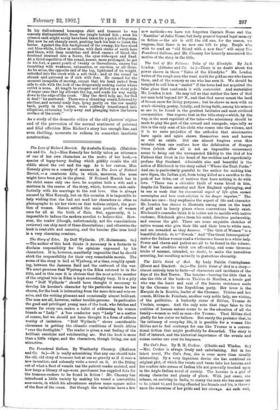The Goa of His Fathers : Tales of the Slondyke.
By Jack London. (Isbister and Co. Gs )—There is no doubt about the power shown in these "Tales of the Klondyke." Mr. London writes of the rough men who wont north for gold as one who knows them, and of the scenery as one who has seen it. We should be tempted to call him a "realist" if the term had not acquired the false gloss that confounds it with materialist. And materialist Mr. London is not. Ile may tell us that neither the laws of God nor man hold beyond 50° N., and that God never meant the land of frozen snow for living purposes ; but he shows us men with as much chivalry, poetry, loyalty, and living faith, among his miners as are to be found in the gentlest latitudes and most civilised communities. One regrets that in the title-story—which, by the way, is the most repellent of the tales—the missionary should be made to play the part of the coward and renegade, especially as this is the only man of his cloth who comes into the volume, and it is no mere prejudice of the orthodox that missionaries have again and again shown themselves men and heroes as well as saints. But one almost forgives even this mistake when one realises how the defalcation of Sturges Owen (which after all is not an impossible occurrence) seems to bring out the unsuspected fidelity to the God of his Fathers that lived in the heart of the reckless and superficially profane Hay Stockard. Admirable also and beautiful is the action of Hitchcock in the story called "Where the Trail Forks." And one is particularly grateful to the author for making him save Sipsu, the Indian girl, from being killed as a sacrifice to the gods of her tribe, out of motives that have nothing to do with love. "There was a chivalric thrill of warm blood in him, despite his Yankee ancestry and New England upbringing, and he was so mad,e that the co»iniercial aspect of life often seemed meaningless and bore contradiction to his deeper impulses." The italics are ours : they emphasise the aspect of life and character Mr. London has chosen to illustrate among men on the track of gold and in lonely places where conventions barely exist. Hitchcock's comrades think it is better not to meddle with native customs; Hitchcock gives them his mind, dissolves partnership, and rescues the girl. There are some exquisite sketches of native women who give their life and their love to white men, and are rewarded as they deserve. "The Grit of Women" is a beautiful sketch. So is" Siwash." And "The Great Interrogation" makes the Indian woman read a wholesome lesson to a white lady. Power and charm and pathos are all to be found in the volume. But it has crudities which are affronting, and some tiresome tricks of manner, intended, no doubt, to make the narratives arresting, but resulting actually in gratuitous obscurity.










































 Previous page
Previous page